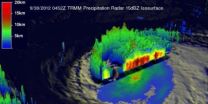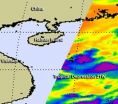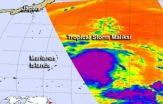(Press-News.org) "Betcha can't eat just one!" For obese people trying to lose weight, the Lays potato chip advertising slogan hits a bit too close to home as it describes the daily battle to resist high calorie foods.
But new research by Terry Davidson, director of American University's Center for Behavioral Neuroscience, indicates that diets that lead to obesity—diets high in saturated fat and refined sugar—may cause changes to the brains of obese people that in turn may fuel overconsumption of those same foods and make weight loss more challenging.
"It is a vicious cycle that may explain why obesity is so difficult to overcome," said Davidson, also a professor of psychology at AU.
Davidson recently published his research, "The Effects of a High-Energy Diet on Hippocampal-Dependent Discrimination Performance and Blood-Brain Barrier Integrity Differ for Diet-Induced Obese and Diet-Resistant Rats," in the journal Physiology & Behavior.
Fat Rats Suffer Memory Impairment, Damage to Brain's Armor
Davidson, formerly with Purdue University, focuses his research on the hippocampus—the part of the brain responsible for memory and learning.
For this study, Davidson and his team trained rats given restricted access to low-fat "lab chow" on two problems—one that tested the rats' hippocampal-dependent learning and memory abilities and one that did not. Once the training phase completed, the rats were split into two groups: one group had unlimited access to the low-fat lab chow, while the other had unlimited access to high-energy (high-fat/calorie) food.
The high-energy food was high in saturated fat (animal fats, such as those found in cheese or meat or certain plant-based fats, such as cottonseed oil and coconut oil)—considered to be the most unhealthful dietary fat as research has linked it to cardiovascular disease and certain types of cancer.
When both groups of rats were presented the problems again, the rats that became obese from the high-energy diet performed much more poorly than the non-obese rats did on the problem designed to test hippocampal-dependent learning and memory. They tested the same as the non-obese rats on the other problem.
When the researchers later examined all of the rats' blood-brain barriers (if the brain were an exclusive nightclub, the blood-brain barrier—a tight network of blood vessels protecting the brain—would be the bouncer at the door carefully policing who gets in), they found that the obese rats' blood-brain barriers had become impaired as they allowed a much larger amount of a dye that does not freely cross the blood-brain barrier into the hippocampus than did blood-brain barriers of the non-obese rats (the dye was administered to all of the rats).
Interestingly, the non-obese rats group included rats from both the low-fat lab chow group and the high-energy diet group. But this isn't a matter of some rats having a super-high metabolism that allowed them eat to large amounts of the high-energy food and remain a reasonable weight.
"The rats without blood-brain barrier and memory impairment also ate less of the high-energy diet than did our impaired rats," Davidson said. "Some rats and some people have a lower preference for high-energy diets. Our results suggest that whatever allows them to eat less and keep the pounds off also helps to keep their brains cognitively healthy."
A Vicious Cycle
The hippocampus is also responsible for suppressing memories. If Davidson's findings apply to people, it could be that a diet high in saturated fat and refined sugar impacts the hippocampus's ability to suppress unwanted thoughts—such as those about high-calorie foods, making it more likely that an obese person will consume those foods and not be able to stop at what would be considered a reasonable serving.
"What I think is happening is a vicious cycle of obesity and cognitive decline," Davidson said. "The idea is, you eat the high fat/high calorie diet and it causes you to overeat because this inhibitory system is progressively getting fouled up. And unfortunately, this inhibitory system is also for remembering things and suppressing other kinds of thought interference."
Davidson's findings are compatible with other studies finding a link between human obesity in middle age and an increased likelihood of developing Alzheimer's disease and other cognitive dementias later in life.
"We are trying to figure out that link," Davidson said. "We have compelling evidence that overconsumption of a high fat diet damages or alters the blood-brain barrier. Now we are interested in the fact that substances that are not supposed to get to the brain are getting to it because of this breakdown. You start throwing things into the brain that don't belong there, and it makes sense that brain function would be affected."
A Lifelong Battle
As evidenced by contestants of NBC's reality show "The Biggest Loser," formerly obese celebrities who undergo gastric by-pass surgery, and other numerous examples of extreme weight loss, it is possible for obese people to win the battle of the bulge. Unfortunately, the attempt to keep it off is, more often than not, a lifelong battle that requires permanent lifestyle changes. Davidson says this could be due in part to permanent changes in the brain.
"I do think it [the damage] becomes permanent, but I don't know at what point it becomes permanent," Davidson said. "Other research has found that obese people and formerly obese people have weaker hippocampal activity when consuming food than do people who have never been obese. Just because you lose the weight doesn't mean you regain the brain function. This could help explain why it is so difficult for formerly obese people to keep the weight off."
INFORMATION: END
NASA satellites continue to watch the long-lived Nadine in the eastern Atlantic. Today, Oct. 1, NASA satellite data revealed that Nadine has weakened from a hurricane and is now a tropical storm.
Over the weekend of Sept. 29 and 30, Hurricane Nadine dramatically rebounded. On September 19, 2012 Nadine appeared to be dissipating quickly and was expected to become post-tropical but after over a week of meandering near the Azores, Nadine sprang to life again as a hurricane on Friday September 28, 2012.
NASA's Tropical Rainfall Measuring Mission (TRMM) satellite's path ...
The twenty-first tropical depression of the northwestern Pacific Ocean was born as a NASA satellite flew overhead on Oct. 1, capturing its "baby picture" in infrared light.
On Monday, Oct. 1 at 1500 UTC (11 a.m. EDT), Tropical Depression 21W (TD21W) had maximum sustained winds near 25 knots. It was centered about300 nautical miles south of Hong Kong, near 17.4 North latitude and 114.8 East longitude. TD21W has tracked northward at 5 knots and is expected to curve to the northwest and west.
On Oct. 1, 2012, infrared imagery from the Atmospheric Infrared Sounder (AIRS) ...
The western North Pacific is in full swing, tropically speaking and NASA observed the birth of Tropical Storm Maliksi on Sept. 30. NASA's Aqua satellite captured an infrared image of the storm when it was a depression and revealed a large area of powerful thunderstorms around its center that hinted at its strengthening.
Tropical Storm Maliksi formed from the twentieth tropical depression of the western North Pacific typhoon season. Tropical Depression 20W formed on Sept. 20 about 305 nautical miles from Guam near 16.3 North and 149.0 East. It is moving to the north-northwest ...
OAK BROOK, Ill. – New research from the Netherlands shows that the switch from screen film mammography (SFM) to digital mammography (DM) in large, population-based breast cancer screening programs improves the detection of life-threatening cancer without significantly increasing detection of clinically insignificant disease. Results of the study are published online in the journal Radiology.
DM's higher sensitivity at detecting breast cancer raised concerns that its introduction into screening programs would increase the diagnosis of clinically unimportant cancers—cancers ...
OAK BROOK, Ill. – Water diffusion measurements with MRI could decrease false-positive breast cancer results and reduce preventable biopsies, according to a new study published online in the journal Radiology. Researchers said the technique also could improve patient management by differentiating high-risk lesions requiring additional workup from other non-malignant subtypes.
Dynamic contrast-enhanced MRI (DCE-MRI) has emerged in recent years as a useful tool in breast cancer detection and staging. One of its primary limitations is a substantial number of false-positive ...
Washington — In an article published today (October 2, 2012) in the peer-reviewed journal Environmental Health Perspectives (EHP), People for the Ethical Treatment of Animals reports that the U.S. Environmental Protection Agency (EPA) High Production Volume (HPV) Chemicals Challenge Program had the potential to use 3.5 million animals in new testing, but after the application of animal-saving measures, approximately 127,000 were actually used. Although this toll in animal lives is high, it would have been many times worse had PETA not obtained major concessions from the ...
Stroke care has improved considerably in Alberta following the implementation of the Alberta Provincial Stroke Strategy (APSS), leading to more targeted patient care and fewer health complications, according to a study presented today at the Canadian Stroke Congress.
Nearly 97 per cent of stroke patients received a brain-imaging scan during their admission to hospital in 2011, compared to 88 per cent before the APSS was implemented in 2006.
"The faster a patient has access to brain imaging, the faster they get the right diagnosis and the right treatment," says lead ...
Improvements to the diagnosis and screening of sleep apnea are critical to stroke prevention, according to new stroke care guidelines released today at the Canadian Stroke Congress.
Obstructive sleep apnea, a disorder where the flow of air to the brain pauses or decreases during sleep, is both a risk factor for stroke and a complication following stroke, according to the Canadian Best Practice Recommendations for Stroke Care.
Among the general population sleep apnea increases the likelihood of having a stroke, even after controlling for other stroke risk factors, such ...
A study of stroke patients from Southern Ontario found those who smoke have more difficulty with problem-solving and decision-making than non-smokers.
The study, presented today at the Canadian Stroke Congress, tested mental abilities of 76 patients, including 12 smokers, with an average age of 67.5 years, using the Montreal Cognitive Assessment (MoCA) tool. The MoCA exam tests patients with memory and problem solving questions and gives them a score out of 30.
Smokers had a median MoCA score two points lower than non-smokers -- 22 out of 30 compared to 24 out of 30. ...
Widespread use of telestroke -- two-way audiovisual linkups between neurologists in stroke centres and emergency rooms in underserved and rural areas -- would save lives, reduce disability and cut health-care costs in all parts of Canada, according to a major national report released today at the Canadian Stroke Congress.
However, despite repeated research that shows telestroke delivers quality stroke care to underserviced areas, few stroke patients in Canada are benefiting from this lifesaving service.
"The case for telestroke is compelling and the need is urgent," ...


